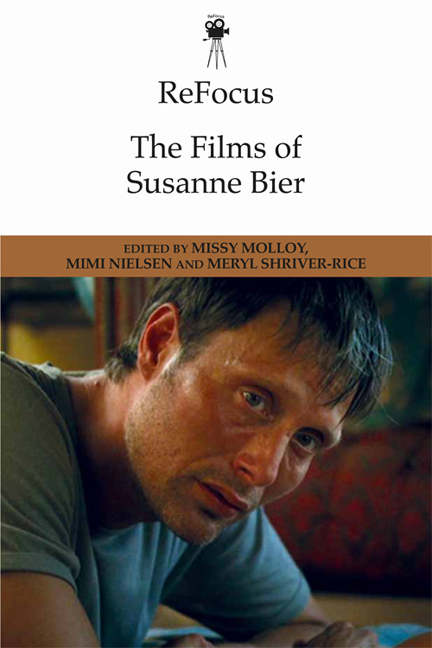Book contents
- Frontmatter
- Contents
- List of Figures
- Notes on Contributors
- Foreword
- Introduction: Susanne Bier's Boundary-Crossing Screen Authorship
- Part 1 Generic and Industrial Fluidity
- Part 2 Negotiating Identity
- Part 3 Authorship and Aesthetics
- Part 4 Transnational Reach
- Postscript: A Conversation with Susanne Bier
- Filmography of Susanne Bier
- Acknowledgments
- Index
6 - Judaism and Danish Directors: The Case of Lars von Trier vs. Susanne Bier
Published online by Cambridge University Press: 01 May 2021
- Frontmatter
- Contents
- List of Figures
- Notes on Contributors
- Foreword
- Introduction: Susanne Bier's Boundary-Crossing Screen Authorship
- Part 1 Generic and Industrial Fluidity
- Part 2 Negotiating Identity
- Part 3 Authorship and Aesthetics
- Part 4 Transnational Reach
- Postscript: A Conversation with Susanne Bier
- Filmography of Susanne Bier
- Acknowledgments
- Index
Summary
Susanne Bier and Lars von Trier are arguably the most internationally successful contemporary Danish directors. While radically different stylistically, both directors regard themselves as outsiders within the Danish cinematic tradition, describing their styles as “un-Danish” and on multiple occasions setting themselves apart from their fellow Danish directors. In part, this “outsider” sentiment is connected to their being a part of the Jewish minority in Denmark and subsequently growing up with a feeling of being different, although von Trier found out as an adult that his Jewish identity was mistaken. Perhaps as a result of his mistaken identity, von Trier has openly expressed distaste for Bier and her films and even referred to her and her Jewishness in his now infamous rant at the Cannes film festival in 2011.
Both Bier and von Trier have benefitted from the “transnational turn” in Danish film production, gaining access to international financing, international film stars, and audiences; most importantly, it has allowed them to address topics, interests, and concerns that are not bound by national culture and language. Through a change in the Danish film laws in 1989, the definition of Danish film was broadened, which, for example, allowed films in languages other than Danish to be granted support from the Danish Film Institute (Bondebjerg 2005: 121). Von Trier was instrumental in bringing about this change by challenging established film policies with his English-language film The Element of Crime (1984). The new film policy was a denationalizing act, in a sense, that opened the door for international co-productions to apply for funding. Whereas previous film law considered a film Danish only if the language and majority of talent were Danish, after 1989 it was enough for a film have a Danish producer and be in Danish or contribute to film culture in Denmark (Hjort 2005: 12). The establishment of the Nordisk Film & TV Fond a year later, along with pan-European funds like Eurimages (1988) and MEDIA Programme (1991), provided further incentives for Scandinavian filmmakers to make films with funds culled from various transnational sources. For instance, Bier's first film, the Swedish-language Freud's Leaving Home (Freud flyttar hemifrån …, 1991), and von Trier's English- and German-language Europa (1991) both received funds from the Danish Film Institute as well as from multiple other Scandinavian or European sources.
- Type
- Chapter
- Information
- ReFocus: The Films of Susanne Bier , pp. 113 - 133Publisher: Edinburgh University PressPrint publication year: 2018



